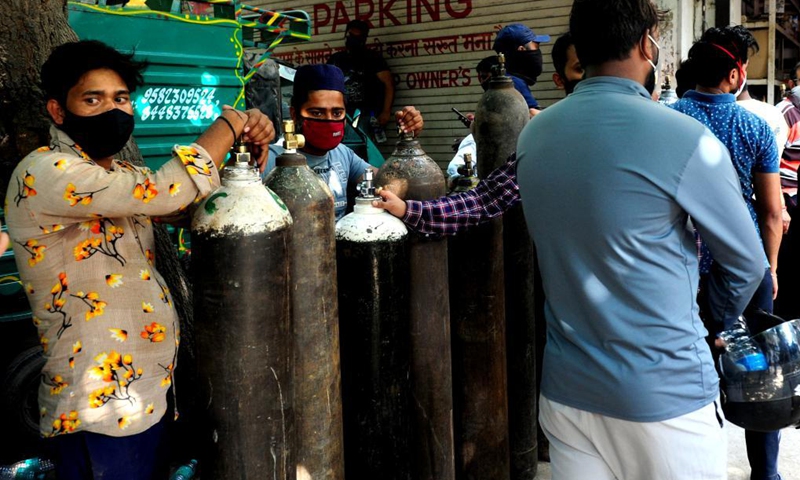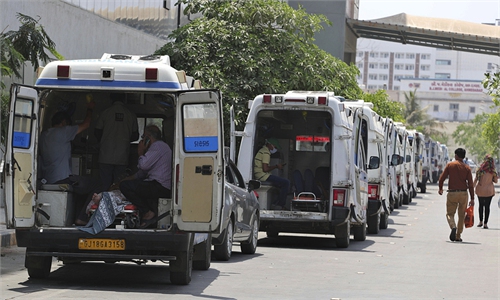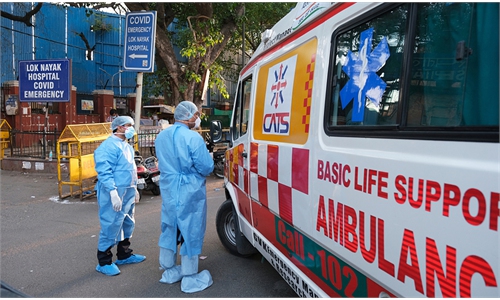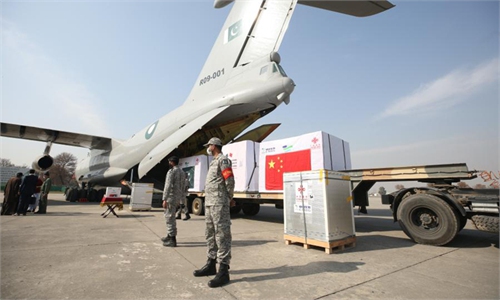Nationalism caused new wave in India, it should avoid the mistake again

People wait in line to refill empty medical oxygen cylinders for COVID-19 patients in front of a shop in New Delhi, India, April 26, 2021.(Photo: Xinhua)
Chinese government and companies are ramping up efforts in their support to India's COVID-19 battle. However, it's noticeable that nationalist sentiments are still brewing in India. If this becomes misguided, it may obstruct the COVID-19 fight in the country.
Some Indian netizens have expressed objections to goodwill gestures from China after the Chinese Embassy in Sri Lanka announced on Twitter that 800 oxygen concentrators were airlifted from China's Hong Kong Special Administrative Region to Delhi and 10,000 more in a week. They left comments below the post, including words like, "Always be wary of devil's helping hand," and, "First, they sent us virus, then they show this drama."
Surging new cases have quickly overwhelmed India's public health system. On social media platforms, SOS posts are rife asking for medical resources, such as oxygen. The new wave of COVID-19 has posed a huge challenge to the Modi administration. Unlike the first wave, India's middle class are more seriously impacted by the coronavirus this time. Many Indian social elites are infected, including celebrities in the political arena. These people have various ways to express their demands and dissatisfaction.
Some people are concerned that under the impact of COVID-19, India could be becoming more nationalist and religious. A clear case in point: Indian Prime Minister Narendra Modi took advantage of Hindu nationalism to come into power and the Modi administration has implemented Hindu nationalist policies. If India's epidemic cannot be controlled in the short term, some are worried that extreme religion and nationalism could be applied to mask deeper difficulties.
"The COVID-19 epidemic may make the Indian society extreme. Religious organizations and nationalism may become the only ways to organize, unify and mobilize the society. In fact, this is basically India's current situation and it needs further observation whether such a trend will intensify," said Liu Zongyi, secretary-general of the Research Center for China-South Asia Cooperation at Shanghai Institutes for International Studies.
The latest wave also overwhelmed the country's medical resources, resulting in a significant increase in infection and death rates. This will undoubtedly have a negative impact on India's economic and social development. Besides, the opposition party can use the condition to attack Modi's response to COVID-19. Naturally, the Modi administration is facing enormous pressure internally.
However, relying on nationalism to mobilize Indian society may cause more troubles. In fact, India's new outbreak is related to the country's rising nationalism.
To compete for international influence, India previously provided COVID-19 vaccines to neighboring countries - even if it was not really capable to do so. Now, India has to face the reality of vaccine shortages. Many senior Indian officials also exaggerated India's capabilities for the sake of "national image." This included the capacity of vaccine production and industrial manufacturing.
"India hasn't solved its own problems well, but it is scrambling for the so-called international status out of nationalism. It in fact has put the nonessentials before the essentials, which is detrimental to India's epidemic prevention and control," Long Xingchun, a senior research fellow with the Academy of Regional and Global Governance at the Beijing Foreign Studies University and president of the Chengdu Institute of World Affairs, said.
Long emphasized that nationalism cannot change India's fate. Diverting contradictions by fanning nationalism instead will undermine India's anti-epidemic efforts. This will further distract the country's attention from implementing proper prevention and control measures.
Many rational voices still remain in India, and religious extremism and nationalism haven't become a very severe problem. However, Indian society must keep on high alert against escalating nationalist and religious fanaticism.
The author is a reporter with the Global Times. opinion@globaltimes.com.cn



